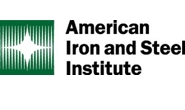Government/Policy

March 5, 2019
Gibson Continues to Make the Case for Steel Tariffs
Written by Tim Triplett
In the recent op-ed below, American Iron and Steel Institute President and CEO Tom Gibson reiterated AISI’s support of steel tariffs and opposition to congressional legislation called “The Bicameral Congressional Trade Authority Act,” which would prematurely terminate the tariffs. “The massive overcapacity in steel still exists globally. And China in particular is producing steel at record levels—exceeding one billion net tons in 2018,” Gibson said. “This means there is plenty of excess supply that will flood into our market but for the continuation of the Section 232 tariffs.” Gibson will offer the industry view of tariffs and trade as a keynote speaker during Steel Market Update’s Steel Summit Aug. 26-28 in Atlanta. Click here for more information or to register.
Dumped and subsidized steel imports have damaged the health of the American steel industry, which directly and indirectly supports more than two million jobs. Unfairly traded imports have caused steel plants to shutter and production of certain steel products to move offshore.
Nearly every military platform and weapons system in our nation’s arsenal is dependent on steel produced in America. Our national security depends on steel for critical infrastructure including transportation, health, and public safety, in addition to commercial, industrial and institutional complexes.
Our security also depends on a reliable domestic energy supply, including the products made from steel that are necessary to develop and transport energy and power our electrical grid. All of these critical applications require consistent, high-quality, on-shore supply sources, which is at risk if this trade cheating is allowed to continue.
In response to the steel crisis that has been over a decade in the making, and after an extensive nine-month investigation by the Department of Commerce, the president determined under Section 232 of the Trade Expansion Act that imports of steel products threatened to impair our national security.
He imposed a 25-percent tariff on steel imports. This necessary action has allowed the American steel industry to begin to recover. Capacity utilization at existing mills has increased in recent months to over 81 percent — levels not seen in the last 10 years.
Shipments of steel mill products were 4.8 percent higher in 2018 than in 2017, and steel imports have decreased 37 percent since the steel tariffs took effect. The Section 232 trade remedy has also resulted in the reopening of some shuttered plants, the hiring back of laid-off workers and investments in new steel production facilities.
Contrary to what some groups are saying as they lobby the Hill, the Trump administration’s policies are benefiting the broad manufacturing sector.
In 2018, manufacturing sector industrial production growth was at its highest since 2012, and manufacturing payrolls were the highest since the Great Recession.
This climate, and the Section 232 steel tariffs, have enabled key planned investments in the steel industry to move forward, which continue to create jobs and contribute to economic growth.
But this recent progress will evaporate and our steel industry will again suffer dire circumstances if the tariffs are prematurely terminated, as is contemplated in “The Bicameral Congressional Trade Authority Act.”
While conditions in the U.S steel industry have improved recently due to the administration’s trade actions and tax and regulatory reform policies, we cannot let up on the fight yet — there is still more work to be done.
There are more than 560 million metric tons of excess steel capacity in the world today, according to the OECD. China’s record steel production exceeded one billion net tons in 2018 — more than 10 times all of the American steel production.
This, along with China’s high level of steel exports, continues to destabilize the global industry and threaten American steelmakers.
Also contrary to what is being said in some recent ad campaigns, the last time broad-based steel tariffs were imposed (in the steel Section 201 case in 2002), the International Trade Commission (ITC) estimated that there was no significant economic impact on the U.S. economy as a whole.
In fact, depending on the methodology used, the ITC noted that there may have been a small positive economic impact.
The steel tariffs are providing much needed relief to the American steel industry and incentivizing other countries to join us in our continued fight to address the global overcapacity crisis. This is already occurring with Canada and the European Union enacting their own safeguards.
Steel is the backbone of American manufacturing. The Section 232 trade remedy is critical to ensuring steel remains a vital asset for our national and economic security, and that steel producers remain at the forefront in developing the most advanced steel products for all Americans.







